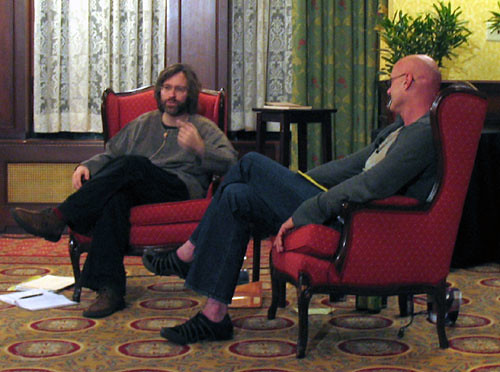
[Wilber and Gafni - the Integral Club]
Over at Facebook, Bruce Kunkel asked a a pertinent question about the present and future of the integral project - we have had an excellent discussion around the topic. In this post at his Dignity and Disaster blog, John Wagnon expands on the comments he made in that thread.
I have only had time to make one comment on the thread, which I will include below.
Read the whole post.Commodification of Integral Theory and Practice.
I wrote the following in response to a thread my good friend Bruce Kunkel stared on Facebook.
His status was:"Is integral thought in danger becoming "clubby" and "orthodox"? Do you believe that integral thought and progress have the greatest opportunity for authentic fleshing out as open source? - as "radically free". Or do you feel that commercial gatekeepers/commodifiers to integral dialog and discussion is the right turn to make?"Forgive the disjointed nature of this post. I wrote a lot on Bruce's thread and gathered it together here. Hopefully it makes some kind of sense. The last few paragraphs are new, so my friends from FB can just jump to the end.
The integral subculture can't skip stages, regardless of the individual development of some of the participants. Our social structure is Red/Amber - not even Orange. Consider whether the leaders of the integral subculture are beholden to any communal standards of ethics or behavior. Is there any body to which members of the integral subculture may appeal in case of dispute? There really isn't. We're kings, courts, and serfs. The kings cooperate because it suits them to. When it no longer suits them, they will go off on their own.
Perhaps the more relevant question is whether we can escape being a subculture. I'm not sure we can.
Getting to the point of critique is important. I have strong areas of disagreement with Wilber as well, however I'm probably not the best person to pursue the debate. More I am aware of them as i pursue applications. The metatheoretical view is very helpful to differentiating and contextualizing Wilber's work. I think it ends up being simultaneously more powerful and less powerful than many realize. Bonnie has said - and I follow some of her line of thought on this - that much of what she's doing was consciously and subconsciously implicit in Wilber's work all along. I think there's a lot of great work here to be done.
Still - that doesn't have much to do with the social holon that is the integral community. Our individual development, opinions, etc. do not necessarily determine how we interact. Its both a function of our individual social lines of development and the social structures we put in place. To the extent that we *are* putting social structures in place, they are pre-democratic, imho.
OK, so here are some of my thoughts on this topic (with a few slight edits from the original post):
basic observation: I came to integral in the early 1990s, when KW was still building his model, still open to a P2P ethic of knowledge acquisition (or so it seemed from the outside) - he was still willing to engage in conversation with critics or alternate models - when Integral Institute formed around 2001-ish, that seemed to end, and the inner circle became insular and incestuous - I think it's worth noting that many people Wilber originally chose have questionable pasts/presents (Gafni, Cohen, Beck, Kempton, various followers of Adi Da, et al) - and it seems to be ONLY those people who have remained as the "inner circle" (except for Beck), while the other very bright people involved in founding I-I have moved away to do their own thing, or continue doing it - in that sense YES, integral (at least the AQAL version) is very clubby and insular, and they love to pat themselves on the back while ignoring all the shadow stuff swirling around themI have also made statements on this topic in an interview last summer with Jeremy Johnson at Single Eye Movement.
AND, there are many independent integral scholars, teachers, researchers doing a LOT of fine work that makes integral an open source project - some of us (and I count myself here although I have yet to produce anything of substance) are trying to find ways to bring integral into application rather then merely theory - Mark Forman and Elliott Ingersoll (and Andre Marquis) have done this admirably in psychotherapy, and it needs to continue with specific books on depression, anxiety, schizophrenia treatment in an integral model - people like Michael Commons and Sara Ross are doing great work in adult development and pointing out the weaknesses in Wilber's metatheory - Bonnitta Roy, Zachary Stein, and the various editors and contributors at Integral Review and Integral Leadership Review are also pushing the model forward - we need LOTS more of this work
right now, I-I still holds power in the integral landscape - the self-appointed right to say who is integral and who is not - when Wilber passes, as he must (we all do), that hegemonic power will crumble
in the meantime, we need to make integral a viable research field, doing a LOT of basic research in various fields implementing elements of the model - we need to apply for grants, publish articles in academic journals, and become teachers - and we need to do a lot of this without making reference to Wilber (who is not widely known or respected in academic circles) - but we CAN use KW's sources, like Kegan, Loevinger, Graves, et al, and bring in the people KW ignored or did not see, such as Jerome Bruner, Vygotsky, Ken Gergen, and more contemporary philosophers, post-postmoderns
we are the future of integral, if we are willing to step up
Tags:
No comments:
Post a Comment